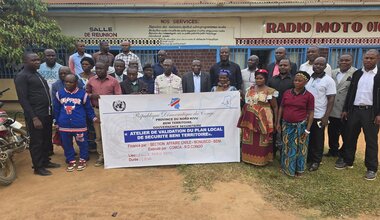The UN releases preliminary findings of the inquiry into massive rapes in Walikale territory
Kinshasa, 24 September 2010 - The United Nations publishes the preliminary report of a special inquiry into mass rapes and other human rights violations committed between 30 July and 2 August during attacks by armed groups in the territory of Walikale, North Kivu province. From 25 August to 2 September 2010, a team from the United Nations Human Rights Joint Office (UNHRJO) in the DRC visited 13 villages along the Kibua-Mpofi axis to conduct an in-depth investigation.
The main preliminary findings show that at least 303 civilians were raped, including 235 women, 13 men, 52 girls and 3 boys. The report stresses that "these figures may well be higher as many of the victims haven't come forward with their stories until now due to the rigid local customs, including the risk of rejection and abandonment by their communities. In addition, half of the population is still hiding in forest due to fear of more attacks." The report also says that at least another 116 civilians were abducted, to be used as forced labour.
A MONUSCO joint protection team that had visited the area earlier from August 13 to17, 2010 to assess the security situation and analyze protection needs of the civilian population initially confirmed at least 154 rape cases.
The attacks, which took place mostly in dark, were carried out by a coalition of about 200 members of the following armed groups: Mai Mai Cheka, the Democratic Forces for the Liberation of Rwanda (FDLR), and elements loyal to Colonel Emmanuel Nsengiyumva, a former FARDC officer who was once a member of the CNDP rebel group. Armed with AK-47 rifles, hand grenades and machetes, the attackers initially pretended that they had come to provide security to the population, before launching attacks in small groups against the same population. They subsequently cut off the roads and took control of the Bunangiri hill, which is the only spot providing telephone network facility in the area, thus preventing the population from raising alarm.
"We strongly condemn all the attacks against civilian population," said the Special Representative of the United Nations Secretary-General and Head of MONUSCO, Mr Roger Meece. "MONUSCO continues to investigate in order to throw light on this serious incident. The Mission has already increased the number of its operating bases in the affected areas. The Mission will also reinforce its collaboration with Congolese forces to better assist the population and respond to the real challenges of accessing the most isolated villages, "he added.
The United Nations Joint Human Rights Office also received reports of attacks reportedly carried out by the FDLR over the period from August 1 to 20, 2010, against 19 villages located North-East of Shabunda center, South-Kivu province, with at least 214 rapes. UNJHRO was unable to confirm these allegations because of difficulties in reaching the areas of these attacks, notably due to lack of access roads to these villages and insecurity in the area. Should these latest allegations be confirmed, the total number of rape victims of the armed group attacks in North and South Kivu during July and August 2010 would then be over 500.
 UN
UN United Nations Peacekeeping
United Nations Peacekeeping






